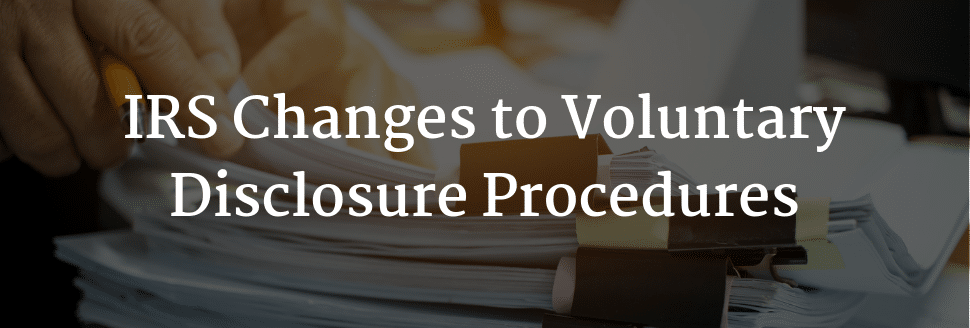IRS Revised Guidelines Offshore Voluntary Disclosure Program On June 18, 2014, the IRS issued revised…
IRS Changes to Voluntary Disclosure Procedures
Individuals and corporations alike have long conducted business or invested their money overseas as a means to try to avoid tax liability here in the United States. They figure that the IRS can’t monitor their activities in another country and that they aren’t really lying if they aren’t reporting money earned here. However, they are wrong on both counts. The IRS does have many means of finding out your overseas activities, and you are liable for the taxes on any income you generate overseas, whether it’s through a job or the profits from a business or investment.

Failing to pay taxes that you have made on overseas income can land you in a lot of trouble. You’ll owe steep penalties and interest on top of the taxes you didn’t pay, and you could be charged with a criminal offense, which could result in jail time and/or other penalties. The IRS has tried to encourage compliance by offering programs that waive some of these penalties and criminal exposure if taxpayers voluntarily report income made overseas in previous years and report previously undisclosed foreign bank accounts.
Over time, the IRS has changed the guidelines for its voluntary reporting programs to close loopholes and to better incentivize taxpayers. The IRS released some updates just last month. Here’s an overview of some of the changes that were made:
Criminal Investigation
The IRS has a unit known as Criminal Investigation, or CI, and this unit will now be responsible for screening all requests for voluntary disclosure to determine if a taxpayer is eligible for making such a disclosure. Taxpayers will now have to fill out a preclearance form to accommodate this screening. The form, Form 14457, will have to be filled before the taxpayer can submit the voluntary disclosure request.
Taxpayers must also submit their request with supporting documentation, such as details about the facts, circumstances, entities, and related parties to their foreign income or assets. Once the preclearance is approved, the IRS will then forward this request and documentation through the process.
Case Development
Standard examination procedures will now be used to handle voluntary disclosures. This means that disclosure requests will be examined, analysts will gather appropriate information and evidence, and the appropriate taxes and penalties will be configured. Taxpayers must cooperate with this investigation. If they do not, their preclearance can be revoked, and they may be subject to criminal penalties and possible jail time. The preferred resolution of all cases involving voluntary disclosure will be the full payment of the taxes, interest, and penalties owed.
Civil Resolution
Many of the changes made to voluntary disclosures involve the civil resolution framework, and these changes apply to disclosure requests received after September 28, 2018. Disclosures are now subject to a six-year disclosure period, which means that the previous six years of tax returns will also be examined to determine if there were any other unreported tax obligations. The examiner can impose maximum penalties for the full duration of this period if the voluntary disclosure request is not resolved by an agreement. Cooperative taxpayers may be allowed to expand the disclosure period so they have additional protection for years where they did not report the appropriate tax liabilities (or underreported them).
The civil penalty for failing to disclose a foreign bank account is determined according to the tax year found to have the highest tax liability not paid. Examiners may apply the penalty to more than one tax year in some cases. They may even apply to all six years in the disclosure period, depending on the circumstances of the case.
These are just some of the changes made to voluntary disclosures, and they are just a few in a long line of changes. Not only can it be difficult for taxpayers to understand these changes, but they may not even be aware of the changes as they are made. That’s why it’s so important for taxpayers to consult with a professional Gilbert tax attorney to learn about their tax obligations, as well as their legal rights.
Silver Law PLC can give you advice and offer representation if you need to navigate the complex guidelines around voluntary disclosure or you need to defend against charges from the IRS. Our skilled and experienced IRS attorneys can represent you in mediation, negotiation on your behalf, or litigate in court. They handle both civil and criminal tax matters. Our goal is to help you avoid criminal penalty and to reduce or eliminate your civil penalties. Call us today to talk with an Arizona tax lawyer and learn about your legal options.

Email: lchapman@silverlawplc.com
Website: taxcontroversy.com
Arizona Location
7033 E. Greenway Pkwy, Ste 200
Scottsdale, AZ 85254
Office:(480) 429-3360
Henderson Location
410 South Rampart Blvd, Suite 390
Las Vegas, Nevada 89145
Office: (702) 801-1000
Las Vegas Location
410 South Rampart Blvd, Suite
390 Las Vegas, Nevada 89145
Office: (702) 726-6819
San Diego Location
7676 Hazard Center Drive, Suite
1525 San Diego, CA 92108
Office: (619) 387-3790
Coronado Location
724 1st St.
Coronado, CA 92118
Office: (619) 612-5337
Utah Location
11576 S. State Street, Suite 1002
Draper, Utah 84020
Office: (801) 340-7514
















Leave a Reply
You must be logged in to post a comment.